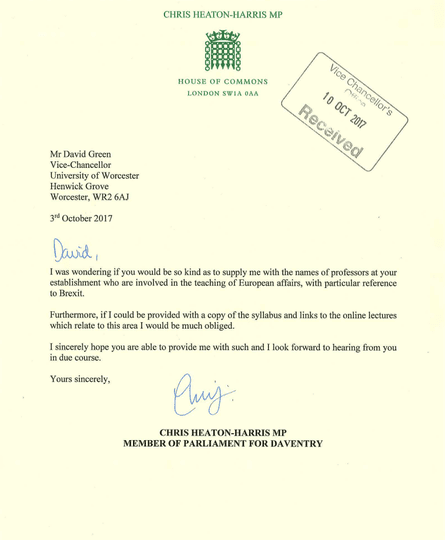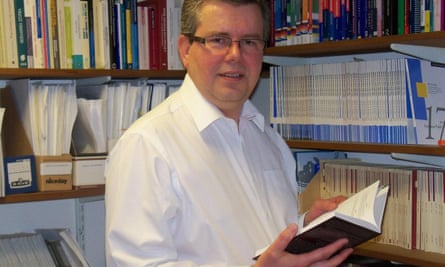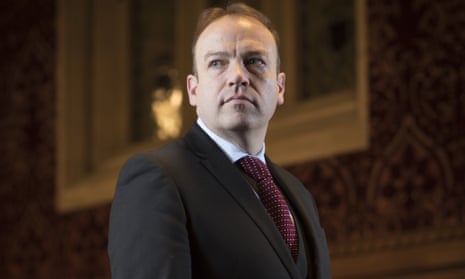Academics are accusing a Tory MP and government whip of “McCarthyite” behaviour, after he wrote to all universities asking them to declare what they are teaching their students about Brexit and to provide a list of teachers’ names.
Chris Heaton-Harris, Conservative MP for Daventry and a staunch Eurosceptic, wrote to vice-chancellors at the start of this month asking for the names of any professors involved in teaching European affairs “with particular reference to Brexit”. Neatly ignoring the long tradition of academic freedom that universities consider crucial to their success, his letter asks for a copy of each university’s syllabus and any online lectures on Brexit.
Prof David Green, vice-chancellor of Worcester University, felt a chill down his spine when he read the “sinister” request: “This letter just asking for information appears so innocent but is really so, so dangerous,” he says. “Here is the first step to the thought police, the political censor and newspeak, naturally justified as ‘the will of the British people’, a phrase to be found on Mr Heaton-Harris’s website.” Green will be replying to the MP but not be providing the information requested.

Prof Kevin Featherstone, head of the European Institute at the LSE, is also outraged: “The letter reflects a past of a McCarthyite nature. It smacks of asking: are you or have you ever been in favour of remain? There is clearly an implied threat that universities will somehow be challenged for their bias.” Featherstone says LSE academics had already feared Brexit censorship after the Electoral Commission made inquiries during last year’s referendum campaign about academics’ debates and research, following a complaint by Bernard Jenkin, another Tory MP. Jenkin filed a complaint when the LSE hosted an event at which the secretary general of the Organisation for Economic Cooperation and Development said there was “no upside for the UK in Brexit”. Jenkin, a board member of the Vote Leave campaign, also accused the LSE’s Centre for Economic Performance of producing partisan research designed to convince the public to stay in the EU. The commission, whose job is to ensure fair campaigning, investigated and took no action against the university.
A spokesman for the LSE strenuously denies all allegations of political bias. “The freedom for academics to study the major issues facing society, reach their own conclusions, and engage in public debate is essential for the health of our universities and the UK’s world-leading research base,” he says.
Featherstone says: “I understand the LSE received calls from the Electoral Commission asking about speakers and the costs of events on an almost daily basis throughout the campaign period.” He argues that both Heaton-Harris’s letter and the Electoral Commission’s investigation pose a threat to the role of universities as free intellectual spaces where academics can explore and question ideas without political interference. He says both developments risk plunging universities into dangerous new political waters.
The Electoral Commission says universities have nothing to fear from its inquiries. “We produce guidance to help all non-party campaigners understand the rules on campaigning and we can advise universities in cases where they may be affected. These do not prevent campaigning or engagement in public debate, but provide the public with transparency about who is spending what in order to influence their vote.”

More than 80% of academics voted to remain, according to a YouGov survey [pdf] commissioned by the University and College Union in January. And within university departments focusing on European affairs, Brexiters are a rarity.
However, university experts on Brexit insist their personal views do not jaundice their teaching, and students are encouraged to question received assumptions and look at issues from all sides.
Julie Smith, director of the European Centre in the politics and international studies department at Cambridge University, says she told a lecture full of graduates about Heaton-Harris’s letter last week. “I told the students what my personal views were and emphasised that they were personal views. I voted to remain, but as an academic, my job is to impart knowledge, encourage debate and develop skills of analytical argument, not to impose doctrine.”
Smith, who is also a Liberal Democrat peer, adds: “If it is the case that a politician thinks he should interfere in the content of what universities are teaching and look at syllabi in order to see whether the correct line is being delivered, that is profoundly worrying.”
Prof Piet Eeckhout, academic director of University College London’s European Institute, says it is unsurprising if most academics working on Europe are in favour of the EU. “I have been teaching EU law for the last 25 years. The fact that I am sufficiently interested to spend all my days working on it obviously means I think EU law is a good thing.”

Pro-Brexit academics working in this area are also unhappy with the MP’s behaviour. Lee Jones, reader in international politics at Queen Mary University of London, is one of the few openly pro-Brexit academics in his field. “During the referendum campaign I said what I wanted and no one tried to shut me up, but I know colleagues elsewhere who have been blanked in the corridors because they voted to leave.”
Yet Jones, too, is outraged by Heaton-Harris’s investigation. “It is really troubling that an MP thinks it is within his remit to start poking his nose into university teaching,” he says. “Universities are autonomous and politicians have no right to intimidate academics by scrutinising their courses. I have colleagues who are die-hard remainers. But I know what they teach and it is not propaganda.”
Chris Bickerton, reader in modern European politics at Cambridge University, and a fellow leave voter agrees. He adds: “In my institution there is strong support for academic freedom. I applied for promotion after the referendum and never did I worry that my views on Brexit would affect the results or my promotional prospects. Nor did I feel any institutional pressure to think one way or the other in the run‑up to the vote itself.”
Heaton-Harris did not respond to requests for a comment.

Comments (…)
Sign in or create your Guardian account to join the discussion